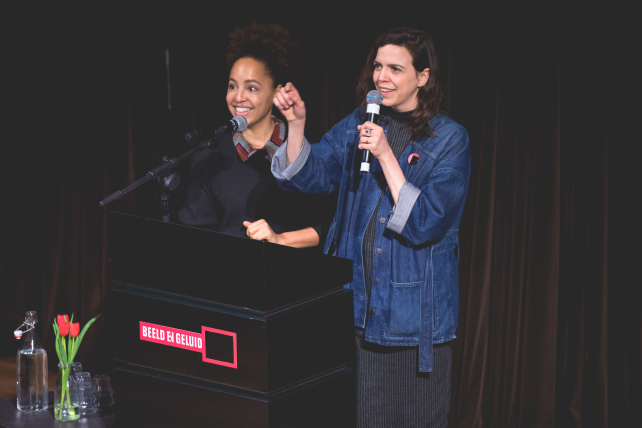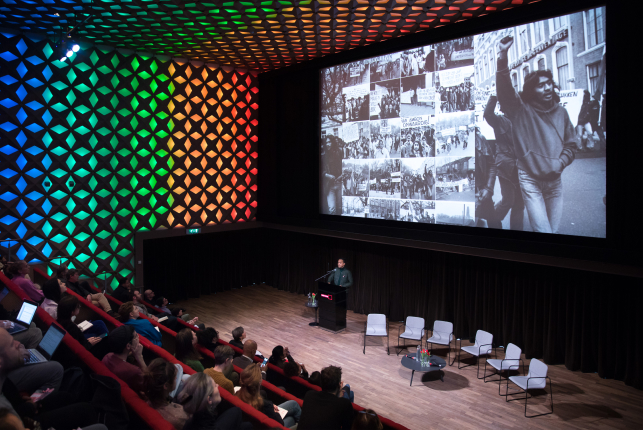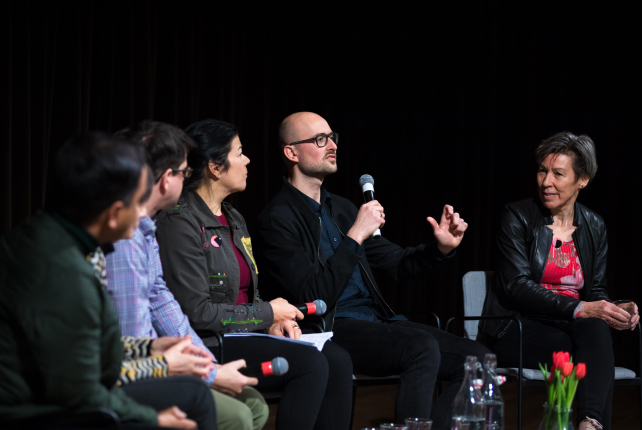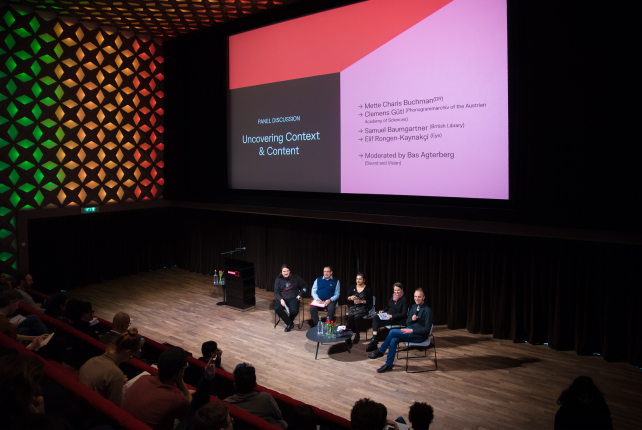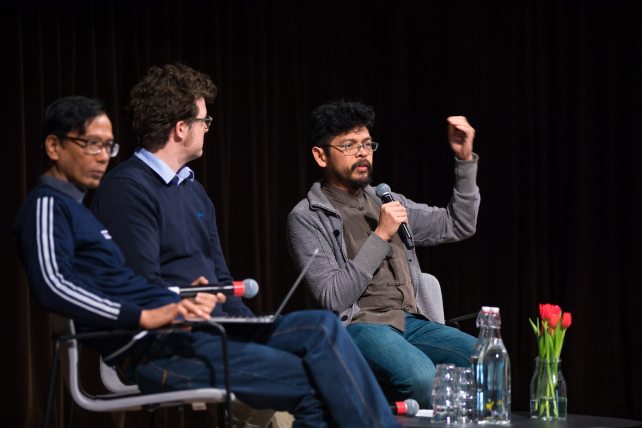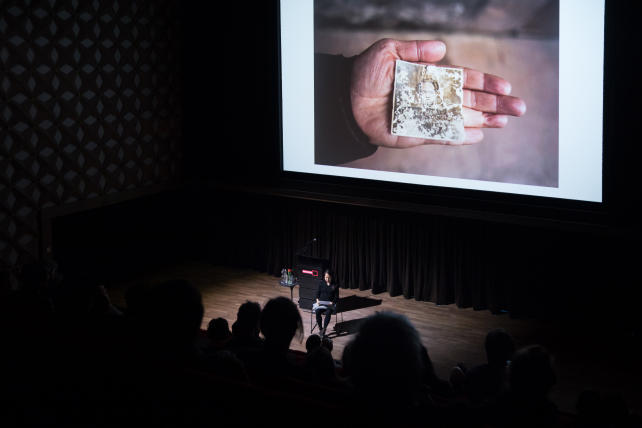Critical Archival Engagements with Sounds and Films of Coloniality
Past Edition:
January 24 & 25 2020

What Could “Decolonizing” the Archive “Look Like”?
Taking a critical archiving approach as its base, Inward Outward explores what is specific to moving image and sound materials, and the archival practices used to collect, preserve and make them accessible. This first edition of the symposium questions the different processes involved in the creation, management and use of archives to unpack social and political configurations that are imbued with questions of power, violence, and representation.
In particular, Inward Outward asks: What are the different practices and actors involved in the creation and management of archives? And how do these actors and methods impact the framing, access and use of archives? How do institutionalised archival practices uphold colonial, imperial, and racist ideologies, and how can these be challenged? What kinds of models question archival practices in an effort to “decolonize” the archive, and how are digital technologies brought into these processes? How should the concept of “ownership” be complicated in the context of archival collections created under duress? And, how can creative professionals venture into the archive to work critically with its structure and materials through artistic practice?
Read more +
Participants of Inward Outward come from diverse disciplines and professions to critically engage with audiovisual archives. These forms of collaboration and conversation, we believe, can render visible what usually remains hidden or obscured and further the agenda of creating more inclusive forms of knowledge production.
Keynote Speaker
The program includes a special keynote lecture from prof. dr. Deborah Thomas.
Deborah A. Thomas
Deborah A. Thomas is the R. Jean Brownlee Professor of Anthropology, and the Director of the Center for Experimental Ethnography at the University of Pennsylvania. She is the author of Political Life in the Wake of the Plantation, Exceptional Violence, and Modern Blackness. Thomas co-directed the documentary films Bad Friday, and Four Days in May, and she is the co-curator of a multi-media installation titled Bearing Witness: Four Days in West Kingston. She is the editor of American Anthropologist.
*Due to unforseen circumstances the second keynote, from prof. dr. Gloria Wekker, taking place the morning of Satuday, January 25 has unfortunately been cancelled.*
Speakers & Moderators
Bas Agterberg (Sound and Vision), Samuel Baumgartner (British Library), Alessandra Benedicty-Kokken (RCMC/Nationaal Museum van Wereldculturen), Marieke Bloembergen (KITLV), Sadiah Boonstra (University of Melbourne/Curator Public Programs Asia TOPA), Mette Charis Buchman (Danish Broadcasting Corporation), Andrea Zarza Canova (British Library), Esther Captain (KITLV), Collence Chisita (University Of South Africa), Brecht Declercq (Flemish Institute for Archiving), Moira van Dijk (IISH), Mitchell Esajas (The Black Archives), Giovanna Fossati (UvA/Eye Filmmuseum), David Frohnapfel, Tao Leigh Goffe (Cornell University), Charissa Granger (Erasmus University Rotterdam), Matthias De Groof, Clemens Gütl (Phonogrammarchiv of the Austrian Academy of Sciences), Gerda Jansen Hendriks (NTR Dutch Public Television), Wigbertson Julian Isenia (UvA/Amsterdam School for Cultural Analysis), Sebastian Jackson (Harvard University), Charles Jeurgens (UvA), Nancy Jouwe, Michael Karabinos (UvA), Vincent Kuitenbrouwer (UvA), Rizki Lazuardi, Sri Margana (Gadjah Mada University, Yogyakarta/University Leiden), Rachel Somers Miles (Sound and Vision), Jonas Van Mulder (KADOC), Leila Musson (IISH), Hetty Naaijkens-Retel Helmrich (Filmmaker Scarabeefilms), Nthabiseng B. Ncala (University of South Africa), Alana Osbourne (KITLV).
The Call for Presentations has now closed, but you can still read the full description by downloading it here.
Programme
Day 1 – Friday January 24, 2020
Form, Audience, Recognition: Transmediality and the Affects of Witnessing
→ Deborah Thomas (University of Pennsylvania)
During the 2010 state of emergency in West Kingston, Jamaica, security forces went into Tivoli Gardens in order to capture Christopher “Dudus” Coke, who had been ordered for extradition to the United States. Officially, 74 civilians were killed during this operation, but the number community members give is closer to 200. Since 2012, I have been working collaboratively with Junior Wedderburn and Deanne Bell on a multi-modal project addressing these events. We have been assembling archives—including drone footage, archival footage, still and moving images of the contemporary landscape, still and video portraiture, and narratives. We are interested in how these assemblages bring into being a range of affective orientations, themselves differently apprehended based on one’s location (politically, structurally, nationally, and psychically). What forms of recognition might be possible across these various locations? How might the archives we’ve developed either generate them or make them unrealisable? In this talk, I will think through these questions as they redound to relationships between format and audience, ethics and politics.
→ Moderator: Alana Osbourne (KITLV)
Image, Identity, and Racial Memory in the Digital Age: Reimagining Archives of Racial Representation in Post-Apartheid South Africa
→ Sebastian Jackson (Harvard University)
How do colonial identities and categories continue to overdetermine social relations and cultural production in a purportedly “postcolonial” present? How might we reimagine the archive and archival research in a globalising world where repositories of knowledge are increasingly circulated and accessible through digital networks? Although traditional institutional archives remain integral to historical research, I contend that there is a dire need for a thorough reexamination of what we mean by “the archive”. How do digital cultural repositories such as YouTube, Google Images, and Instagram provide new means for interrogating colonial histories and their enduring legacies in the contemporary moment? What kind of new challenges do these digital archives hold? This presentation is based on my ongoing doctoral research in South Africa, which examines the unfolding social and cultural legacies of apartheid’s racist anti-miscegenation laws, which prohibited and foreclosed interracial marriage, sex, and intimacy from 1949-1985.
How to Read Dr. Betty Paërl in Stereoscope: Combining Sex/Gender and Colonial Views, Or an Intersectional Analysis of Transgender Heritage
→ Wigbertson Julian Isenia (University of Amsterdam UvA/Amsterdam School for Cultural Analysis) & Eliza Steinbock (Leiden University Centre for the Arts in Society)
We argue that studying objects of transgender heritage involves developing a decisive methodological and conceptual framework related to trans-ing practices across a wide array of cultural contexts and periods. We analyse how the mathematics professor and trans woman, Dr. Betty Paërl, is included in the IHLIA LGBT+ Heritage archive—only highlighting her radical SM sex politics but neglecting her early anti-colonial writings. We contend that an intersectional audiovisual archive might be achieved through reading these materials in stereoscope: meaning analysing these separate “scenes” of Paërl’s life at the same moment. Doing so produces a three-dimensional image—kinky-trans-colonial—of her archival instantiation. Our reading demonstrates how specialised archives like IHLIA can also be used to tell only seemingly supplementary stories about Dutch (post)colonialism. Further, we caution that when the interest is only in Paërl’s importance to queer history, a singular view, one loses a great deal of analytical depth.
Listening at the Door: An Imperial Intimacies Archive Mixtape
→ Tao Leigh Goffe (Cornell University)
In this presentation, I consider how might we define a black feminist archival practice through Black European feminism and approaches taking the lead of Gloria Wekker, Tina Campt, and Hazel Carby. I propose a practice of archival mixtape that I employ in my pedagogical practice through the production of visual soundtracks. Here, I present a soundtrack formed out of the mixed media, artwork, archival footage, and music made for Hazel Carby’s new autobiographical book Imperial Intimacies: A Tale of Two Islands. How we might trouble the coloniality and ethnographic gaze of newsreel footage by using sound and video editing and mixing technologies to remix the colonial archive? Which bodies are permitted to occupy and participate in the archive? And, what space is there for intimacy in the archive?
Dusty Surfaces: Forgetting as a Queer Archival Practice
Jack Halberstam has conceptualised forgetting as a queer practice of remembrance for minority groups. Forgetting allows for the process of moving on from hurtful memories of the past to more bearable forms of being with the past in the present. In The Queer Art of Failure (2011) Halberstam describes: “Forgetting, when directed at a dominant narrative rather than at subaltern knowledges, could become a tactic for resisting the imposition of colonial rule. […] [I]n order to remember and recognize the anticolonial struggles, other narratives do have to be forgotten and unlearned” (77). Forgetting can also be understood as a tactic that screens out normative anticipations of being in this world in order to arrive at a better tomorrow. Taking my own experience of working as a forgetful queer in an ethnographic museum for several months into account, my paper seeks to address if we can use queer forgetfulness as a conceptual framework to disrupt the normative order of knowledge productions of ethnographic collections without further silencing under-represented histories of archival objects within white, cis-gendered, heteronormative, and able-bodied memory institutions.
→ Moderator: Giovanna Fossati (UvA/Eye Filmmuseum – Eye)
Towards an Anticolonial Archival Approach to the Collection Development of Audiovisual Records at the Archival Institutions of South Africa
→ Nthabiseng B. Ncala (University of South Africa) & Collence Chisita (University of South Africa)
For decades in South Africa, audiovisual records (AVR) were created under the apartheid system, resulting in unsettling debates about “archival ownership”. The current procedures of the National Archives and Records Services of South Africa (NARSSA) and the National Film, Video and Sound Archives of South Africa (NFVSA) fall short of readdressing epistemic challenges. While AVR, oral history projects are required to be accompanied by evidence, it is unsettling since most of the legitimate and official materials “evidence” have been destroyed. This paper argues that “evidence” as currently perceived in the South African archival landscape, used and legitimised by NARSSA and NFVSA, perpetuates colonialism. This research examines the role of colonial archives in the collection development process and how it can be decolonised. It proposes a paradigm shift towards a unified effort to decolonise archival praxis within the context of Africanisation.
*Due to unforseen circumstances, the presentation from Nthabiseng B. Ncala & Collence Chisita has unfortunately been cancelled.*
“Unnamed performers chanting in an undocumented language recorded in an unknown location.” Addressing Silences in the British Library’s World and Traditional Music Collections
→ Andrea Zarza Canova (British Library)
The Northcote Whitridge Thomas (1868-1936) collection, with 1011 recordings made in Sierra Leone and Nigeria between 1909 and 1916, was one of the first to be acquired by the World and Traditional Music section of the British Library, when it was established in the 1950s. In 2019, a collection of field recordings documenting the songs and sonic environment of the Wampis’, living in the rainforest in Perú, was donated by Ben Kelly, a conceptual artist raising funds to support them in alliance with an environmental justice charity. What is an institution like the British Library Sound Archive doing to address the challenges raised by historical and contemporary ethnographic sound recordings? This paper will make these challenges audible in the recordings themselves, so we can learn about what we are listening to but also what the British Library’s role and responsibilities are in conscientious knowledge preservation.
Dilemmas in Digitisation and Decolonisation
→ Charles Jeurgens (UvA) & Michael Karabinos (UvA)
In our research we analyse Dutch policy and initiatives of digitising colonial archival legacies to answer our central question of whether digitisation of colonial archival legacies offers possibilities to decolonise these archives. The aspiration to decolonise colonial legacies seems to be a paradoxical statement since there is something innately colonial in the record keeping systems that cannot be removed, yet simultaneously requires deactivation. But with digitisation, new recordkeeping infrastructures are created, shaping new interfaces between documents and users. We argue that decolonising such archives can be based on understanding the complexity of the variables which shape the new digital archival infrastructure. We explore possibilities of developing infrastructures that contribute to decolonising the colonial archival legacy in the sense of offering multivocality and multiple provenance. As a potential solution to these problems we discuss what we call third-space infrastructural frameworks which create opportunities to contribute to the decolonisation of colonial archival legacies.
→ Moderator: Rachel Somers Miles (Sound and Vision)
Not A Light Touch: Artistic Researcher in Residence Talk
Rizki Lazuardi’s artistic practice was challenged during his five-month residency at Sound and Vision, as he had to shift from a working method that previously relied on materiality to a focus on subject matter. He had to resist being distracted by the endless possibilities to develop a work drawn from a variety of different subjects found in Sound and Vision’s broad collection. Settling on a topic, Lazuardi focused his work on exploring malaria and pest disease extermination throughout the first half on the twentieth century, finding it rarely portrayed in Indonesia’s historical reference. Not A Light Touch is a multi-channel installation in which Lazuardi combines archival footage and reproduced images based on physical remnants and vague oral history in Indonesia. These depict the struggles of working class communities in the East Indies to defeat the disease that later affected the industries owned by the Dutch due to worker shortages, a multilayered issue that is rarely discussed in Indonesia.
→ Moderator: Alessandra Benedicty-Kokken (Research Center for Material Culture – RCMC/Nationaal Museum van Wereldculturen)
The Questioning Institutional Practices roundtable is an opportunity for a number of organisations to come together to critically explore their own institution’s practices but also collectively question the power and responsibility of archives. The session begins with presentations from the IISH and The Black Archives to kick-start the conversation, followed by a roundtable discussion with representatives from Sound and Vision, Eye, IISH, KITLV, Nationaal Archief, and The Black Archives. This session asks what questions must archives ask themselves when acquiring (or not), cataloguing, caring for, and offering access to, materials of coloniality? How must institutions think through inclusion and representation not only in terms of their catalogue but also their organisation? How can policies, practices, formal and informal structures be built with the intent of decolonising the archive? And what might decolonising the archive even look like here?
The International Institute of Social History (IISH) and the Decolonisation Debate
→ Eef Vermeij (IISH), Leila Musson (IISH), & Moira van Dijk (IISH)
So far, the IISH has refrained from reflecting on its own position in the recent decolonisation debate, as it sees itself as an archive with a different history and role in society. As an archive for social movements that are threatened by repression, the IISH has tried to contribute to redistributing the power of collective memory towards underrepresented groups in society. To decolonise the archive, the IISH has to look at its own collection history and practice. Looking for archives that document colonialism results in a list of archives whose provenance doesn’t seem to be contested. The IISH started looking for missing voices in its own collections, and will proactively collaborate with marginalised communities during appraisal. This way, the IISH can start a process of becoming a mediator between archive creator and user in a more collaborative and equitable way.
Linking Archives: Exploring Histories of Black and Surinamese Emancipation Movements
→ Mitchell Esajas (The Black Archives)
The Black Archives recently opened the exhibition Vereniging Ons Suriname: 100 Years of Emancipation and Struggle which brings to light hidden stories
of Surinamese people in the Netherlands. Based on unique archival documents, videos and photo material from The Black Archives and other archives including Beeld en Geluid, the exhibition reveals stories about Surinamese emancipation movements since the 1920s, during and after the Second World War. Mitchell will give a presentation about some of the exceptional material that The Black Archives rediscovered and why it’s important to make these hidden histories visible.
→ Sadiah Boonstra (University of Melbourne/Curator Public Programs Asia TOPA)
Guided by Sadian Boonstra, this session offers a platform for open conversation and reflection on the first day of the symposium.
Day 2 – Saturday January 25, 2020
*Sessionn Cancelled*
Due to unforseen circumstances the second keynote, from prof. dr. Gloria Wekker, taking place the morning of Satuday, January 25 has unfortunately been cancelled.
“Show me your archive and I will tell you who is in power”: Racial Identities in the White Dutch and Afro-Surinamese Cultural Archives
→ prof. dr. Gloria Wekker (Utrecht University)
In this keynote, I will reflect— poetically, descriptively and analytically—on different understandings and uses of the concept of racial identities in the white Dutch and Afro-Surinamese cultural archives, the later pertaining both to the Netherlands and to Suriname. The cultural archive, according to Edward Said in Culture and Imperialism (1993), is “a storehouse of a particular knowledge and structures of atitude and reference, (..) [and] structures of feeling”, based on race. Using diferent case studies, from both sides of the Atlantic, and zooming in on images coming to us through news on radio and TV and through conversations, I will lay out some fundamental diferences between these various archives.
→ Introduction by Esther Captain (KITLV)
→ Moderator: Esther Captain (KITLV)
Nascent or Drowsy? Dutch Newsreels about Indonesia 1947-1950
→ Gerda Jansen Hendriks (NTR Dutch Public Television)
Between the end of 1947 and the beginning of 1950, more than 150 newsreels, called “Wordende Wereld” in Dutch, were made about events in Indonesia by the Gouvernements Filmbedrijf Multifilm Batavia, a division of the Dutch Government Information Service. For the outside world, it operated as an independent company and used only the second part of its name, Multifilm Batavia. With the transfer of sovereignty in December 1949, the film studio became the property of the Republic of Indonesia. Nothing was said about the copyright of the films that were produced. But the original newsreels nowadays are all kept at the Nederlands Instituut voor Beeld en Geluid and not in the Indonesian National Archives. How this came about is the subject of the presentation. Examples of reports from typical newsreels will be shown, making a discussion possible about their character and cultural legacy.
Indo-Europeans In and Out of Focus
→ Hetty Naaijkens-Retel Helmrich (Filmmaker Scarabeefilms)
Being a filmmaker of documentaries about Indo-Dutch history with a focus on the Japanese occupation and Bersiap, I am always forced to rely on the same sources in the Netherlands. Very litle film material, bordering on none, is available of Indo-Euro- peans. This particular population group concerns people of both European and Indonesian descent who had the same legal status as the “thoroughbred” Dutchmen and who repatriated to the Netherlands in large numbers afer the
independence of Indonesia. The consequence of the absence of film material is that the existence of this population is still not well known. Fortunately, within the Indo-European population itself, privately held 8mm or 16mm film can be found. But these films are ofen still in private possession. I am proud that I have been able to digitise a number of these films and have included them in our own film archive collection and have been able to incorporate them into my own films: Contract- pensions, Buitenkampers, and Klanken van Oorsprong.
Verloren Banden: Moluccan Footage, Articulating Perspectives in Postcolonial Netherlands
→ Jeftha Patikawa (Verloren Banden)
The audiovisual representation of Moluccans was closely tied to their position in colonial society: loyal and useful subjects. In postcolonial Netherlands, this image gave way to that of a violent, problematic, community in the seventies. Working both within and outside the dominant system, Moluccans did try to articulate their own perspectives in image and sound. Working with audiovisual material generated by a local Moluccan community, documentary maker Jefha Patikawa will talk about the importance of self-representation.
Terrain of Dialogue or Clash of Voices? Curating the White Fathers Missionary Film Collection (1948-1975)
→ Brecht Declercq (Flemish Institute for Archiving – VIAA) and Jonas Van Mulder (KADOC)
The film collection of the Society of the Missionaries of Africa (White Fathers) is the only audiovisual collection on the Flemish List of Precious Heritage (“Vlaamse Topstukkenlijst”). It consists of 83 content entities, mainly mission films from 1948- 1975, mostly shot in today’s DR Congo, Rwanda and Burundi. The entire collection, still owned by the White Fathers, is deposited at KADOC, the Documentation and Research Center on Religion, Culture and Society at KU Leuven. As part of a broad Flemish digitisation programme for audiovisual heritage, VIAA (Flemish Institute for Archiving), funds, tenders and coordinates the restoration and digitisation of the White Fathers film collection, which will ofer opportunities in terms of public accessibility and collaborations with source communities and heritage partners. The speakers will situate the collection in the Flemish colonial/missionary audiovisual heritage landscape and discuss some significant ethical and archival issues regarding “ownership”, “restitution” and “digitisation”.
→ Moderator: Bas Agterberg (Sound and Vision)
“Discussion about Greenland” – DR’s Programmes about Greenland 1951-2009
→ Mette Charis Buchman (Danish Broadcasting Corporation – DR)
Greenland has been a part of Denmark since 1814 when Norway’s former colonies became under the control of the Danish monarch. In 2009 Greenland gained self-rule and Greenlanders were recognised as a separate people under international law. The Danish Broadcasting Corporation has since its very start in 1925 had the obligation to represent and cover Greenland. DR has done so. However, for many years its cover was limited, underrepresented, stereotyped and supportive of any current policy. This show-and-tell presentation will shed light on and show DR’s role as a public service broadcaster in the developing process of Greenland. How and when did DR’s content support the assimilation strategy and how and when did DR’s content push for change? The presentation will argue that it is important to understand the context in which the audiovisual content was produced (the media policies) in order to use the archival material creatively and critically in future productions.
Colonial Traces in Austria? Critical Approaches to Sound Recordings from Africa at the Phonogrammarchiv in Vienna
→ Clemens Gütl (Phonogrammarchiv of the Austrian Academy of Sciences)
By offering insights from a current research and publication project, I will discuss historical sound recordings from Africa at the Phonogrammarchiv of the Austrian Academy of Sciences in Vienna. We are not able to interpret sound recordings correctly, unless the content on sound carriers is accompanied by an in-depth, source-critical evaluation of the surrounding contexts and an adequate interpretation of additional sources. My paper focuses on critical approaches to sound recordings in the context of Habsburg’s colonial past and in close connection to the academic disciplines of African studies and Egyptology in Vienna. This will also allow for a more general discussion about the interpretation of contents on historical sound recordings from Africa in European archives.
Networking and Diasporic Musicking in Sound Archives
→ Samuel Baumgartner (British Library)
“We don’t want Apartheid” and “Agra wedding procession” are recordings recently digitised and catalogued by the British Library’s Unlocking our Sound Heritage Project (UOSH). They were recorded by separate recordists, on separate continents, and for diferent purposes. The two recordings are, however, linked by their melodic material which comes from “Kaise Bani”, a popular Indo-Caribbean chutney song. With these recordings, I aim to advance an understanding of how day to day cataloguing can uncover networks of content that are hidden from view when researching in collection silos. Using theories of decolonisation and diasporic musicking, these networks can build historically absent repertoires with which fractured diasporas can interact and relate back to a diasporic “home”. In an age where projects like UOSH can make archival contents broadly available, these repertoires and interactions present a grassroots approach to decolonising archives through public engagement, creating decolonised structures within sound archives from the ground up.
Veni, Vici, Vidi: The Power to Conquer and to Film
It is no secret that film archives contain historical footage with overtly colonialist messages and intent. Such films are hard to watch today, while subtler products employing similar tactics and language remain harder to recognise and classify. In institutional databases, such films are classified as news items, picturesque travelogues, or educational material to teach geography or history. However, a deeper look and understanding of the historical and political context reveals the gaze of the victorious as well as the intention to re-write history and impose territorial power. Researching the exact context and production of these films and understanding why and for whom such films were made, and how they were consumed, can provide new insights into this type of undervalued archival footage. This presentation will provide examples from the “Views of the Otoman Empire” project to demonstrate how hidden colonialist discourse sneaks through the images into long-term collective memory.
Contributors
→ meLê Yamomo (UvA)
→ Sri Margana (Gadjah Mada University, Yogyakarta/ University Leiden)
→ Vincent Kuitenbrouwer (UvA)
Colonialism created multiple entanglements between people from diferent parts of the globe. With the advent of sound recording and broadcasting technologies in the early twentieth century one important facet of this exchange was the dissemination of sounds, which resulted in all sorts of sonic entanglements. Avidly collecting all sorts of colonial knowledge, Western European powers created huge archives full of sounds and recorded voices from overseas, such as South East Asia. These collections were used to create knowledge to bolster the unequal power relations in the colonies and promote the idea of an empire amongst European publics. The population in the colonies, on the other hand, did not have free access to these recordings. Afer the formal end of empires the Western sound collections continued to exist and were used over and over again, mainly by Western professionals, enabling certain colonial tropes to be reproduced. This panel brings together scholars working in different fields and from diferent perspectives to reflect on the meaning of sound objects that are related to the colonial past and the postcolonial situation. Afer giving short presentations on the context and the content of the objects, the fragments will be played and discussed directly with the audience. This format allows for a dynamic exchange of thoughts about the meaning of colonial sounds and their echoes, and offers a space to create new ideas to use and experience them.
→ Moderator: Nancy Jouwe
Palimpsest of the Africa Museum
In 2013, the Royal Museum for Central Africa closes for renovation. Not only the building and the museum cabinets are in need of renewal: the spirit of the museum has to be brought into this century. In the structural advisory commitee (COMRAF), the process of decolonisation leads to fierce discussions. My presentation shows fragments of a documentary on this renovation, called Palimpsest of the Africa Museum. This film includes and transforms colonial archive materials. Palimpsest is part of a cinematic triptych showing crippled, lame or failed decolonisations. While showing these failed processes, the triptych itself atempts to undo the historic entanglements between the medium of cinema and coloniality as an epistemic relation to the availability of the world. In other words: while I show lame decolonisations, I try to decolonise the medium.
“One Day We’ll Understand”
→ Sim Chi Yin (Magnum Photos/ King’s College London)
Sim Chi Yin’s performative reading “One Day We’ll Understand” takes us on a cinematic journey through her family history and that of the anti-colonial resistance movement in British Malaya—and its consequences. A quiet trauma has sat in Chi Yin’s family—and that of many other Malayans— since the 12-year war against the British between 1948 and 1960. She excavates the story of the grandfather her family tried to forget in the 70 years since the war, and tracks down his compatriots to document their oral histories, artefacts, songs and memories before the whole generation passes on. Her work building a counter-archive of this war—and intervening with the colonial archive—challenges the colonial representations and erasures of this war. It also asks what other stories from the Cold War and decolonisation wars around the Global South we still haven’t yet unearthed.
Doing Wake Work: Decoloniality and an Afro-Curaçaoan Archive
→ Charissa Granger (Erasmus University Rotterdam)
The Zikinza collection is an audio collection of ethnographic recordings done on the island of Curaçao in 1950 and 1960. Recorded by missionary priest Paul Brenneker and musicologist and ethnographer Elis Juliana, the collection consists of songs, stories and rememberings of Afro-Curaçaoans. Composer and percussionist Vernon Chatlein works within this archive, bringing voices from the past into the present and future, illustrating through music that “the past that is not past reappears, always, to rupture the present” (Christina Sharpe, In The Wake: On Blackness and Being, 2016, 9). This paper explores decolonial aesthetics and colonial undoing in music-making by concentrating on artistic practice within the Zikinza-archive. It will focus on how Chatlein, as a composer, approaches the archive and how the new music that emerges from working with the archived sound material enables self-knowledge and self-possession. Such a discussion will afford questions on strategies for decolonising the archive.
Practical info
Venue
The Netherlands Institute for Sound and Vision is specialised in the field of media culture and AV archiving. Sound and Vision arose in 1997 from a merger of three audiovisual archives and a museum, with the task of “managing and preserving the Dutch audiovisual heritage and making it accessible to a wide audience”. In order to fulfill this mission, it was necessary to move from nine locations in six municipalities to one central location. Since late 2006, Sound and Vision has been located in this building at the Media Park in Hilversum. The institute initiates research that makes media heritage available and searchable, follows relevant innovations in media archiving, participates in research projects and experiments with new technologies. Its museum invites visitors to discover the world of media and in particular Dutch media history. The institute also focuses on collecting and preserving Dutch audiovisual heritage and making it available to as many users as possible, focusing on four thematic pillars: “news, information and current affairs”, “culture and entertainment”, “amateur and business productions” and “the media landscape”. The archive is a unique source of information for research, not only for students and academics, but also for journalists, international production companies and broadcasting organisations. The collection includes a wide variety of media, from written press, film, radio and television to computer games, online video and websites—whether or not professionally produced.
Address
Netherlands Institute for
Sound and Vision
Media Parkboulevard 1
1217 WE Hilversum
Accessibility
The building is accessible to people in wheelchairs or with other mobility restrictions. All conference rooms are accessible by lift and have wheelchair-accessible seating. If you require any assistance, please speak to the reception desk.
Mother & Baby Room
The venue has a private room on-site for nursing mothers. Please speak to the reception desk if you’d like to use the room.
Catering
Coffee, tea and refreshments will be provided to all symposium attendees in the atrium area during the breaks.
Lunch
You can buy food and drinks at the restaurant which is located on the lower ground floor of the institute. Both card and cash payments are accepted. You will find more restaurants, bars and take-out options located further away from the institute in Hilversum city centre, 15-20 minutes on foot from the venue. If you are looking for something closer to the venue, we can recommend the snackbar at the nearest train station (Hilversum Mediapark) for something quick as well as the Jumbo supermarket (Stephensonlaan 45). You are also more than welcome to eat a packed lunch or take-out food onsite. Feel free to use the orange seating in the building that leads to the lower ground floor of the institute by the restaurant.
Contact
Please feel free to contact the Inward Outward organizers with questions, comments or feedback at inwardoutward@beeldengeluid.nl. Information can also be found at beeldengeluid.nl/inwardoutward
Symposium Publication
Following the symposium we published an edited collection of contributions from speakers that offers a variety of different written formats to revisit, reflect and expand on the conversations had.
